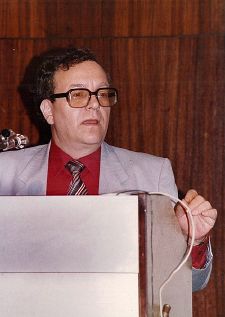Shtromas, Alexander
| Line 56: | Line 56: | ||
==References== | ==References== | ||
| + | * Woodhouse, Tom. ''Peacemaking in a Troubled World''. Berg Pub Ltd, 1991. ISBN 978-0854965946 | ||
*[https://web.archive.org/web/20081014065030/http://biblioteka.vdu.lt/stromas-apie.htm Aleksandras Štromas]. Retrieved on 2008-09-14 | *[https://web.archive.org/web/20081014065030/http://biblioteka.vdu.lt/stromas-apie.htm Aleksandras Štromas]. Retrieved on 2008-09-14 | ||
Revision as of 16:20, 17 February 2022
| Alexander Shtromas | |
 Alexandras Shtromas speaking on the Fall of the Soviet System, Geneva, Switzerland, August 1985
| |
| Born | April 04 1931 Kaunas, Lithuania |
|---|---|
| Died | June 12 1999 (aged 68) Chicago, Illinois, U.S. |
| Nationality | Lithuanian |
| Fields | Political Science |
| Institutions | Bradford University
Salford University Hillsdale College |
| Alma mater | Vilnius University Moscow State University |
| Known for | Human rights activism with participation in dissident movement in the Soviet Union |
Alexander Shtromas (Lithuanian: Aleksandras Štromas; 4 April 1931 in Kaunas, Lithuania – 12 June 1999 in Chicago) was a prominent Lithuanian political scientist, dissident, professor and author.
Biography
Shtromas was born in Kaunas, Lithuania. During the Nazi occupation of Lithuania he was imprisoned in the Ghetto. After he was saved from the Ghetto, Shtromas was harbored by Antanas Sniečkus. He studied at Vilnius University, and later finished at Moscow State University. In 1964 Shtromas defended his doctoral thesis in law. Soon afterward Shtromas became a critic of the Soviet regime and was forced to emigrate. In 1973 he settled in the United Kingdom. There, he was appointed to a position in the Department of Peace Studies at the University of Bradford by Adam Curle.[1] He later worked at Salford University, and, until his death, at Hillsdale College. Aleksandras Shtromas died on 12 June 1999 in the US. A book with tributes by fellow dissidents, academic colleagues and former students (mainly in English but also in Lithuanian and Russian) was published in 2008 in Lithuania, edited by Leonidas Donskis (XX A. Zmogus: Aleksandro Stromo Portretai).
Books in English
- Who are the Soviet dissidents?. 1979.
- Political Change and Social Development: The Case of the Soviet Union. 1981.
- To Fight Communism: Why and how?. 1985.
- The Soviet Method of Conquest of the Baltic States: Lessons for the West. 1986.
- The Soviet Union and the Challenge of the Future with Morton A. Kaplan (eds.). 1988.
- The End of "Isms"?: Reflections on the fate of ideological politics after Communism's collapse (ed.). 1994.
- Totalitarianism and the Prospects for World Order: Closing the Door on the Twentieth Century. 2003.
Articles
- Shtromas, Alexander (Summer–Autumn 1979). Dissent and political change in the Soviet Union. Studies in Comparative Communism 12 (2–3): 212–244.
- Shtromas, Alexander (Autumn–Winter 1987). Dissent, nationalism, and the Soviet future. Studies in Comparative Communism 20 (3–4): 277–285.
Notes
- ↑ McKinlay, Robert A. (1991). "From Harvard to Bradford", Peacemaking in a Troubled World. Berg, 65–6.
ReferencesISBN links support NWE through referral fees
- Woodhouse, Tom. Peacemaking in a Troubled World. Berg Pub Ltd, 1991. ISBN 978-0854965946
- Aleksandras Štromas. Retrieved on 2008-09-14
External links
- Remembering Aleksandras Shtromas Morgan Delp, The Collegian, December 4, 2014.
- Some Memories of Alex Shtromas Gordon Anderson, Professors World Peace Academy, December 18, 2002.
Credits
New World Encyclopedia writers and editors rewrote and completed the Wikipedia article in accordance with New World Encyclopedia standards. This article abides by terms of the Creative Commons CC-by-sa 3.0 License (CC-by-sa), which may be used and disseminated with proper attribution. Credit is due under the terms of this license that can reference both the New World Encyclopedia contributors and the selfless volunteer contributors of the Wikimedia Foundation. To cite this article click here for a list of acceptable citing formats.The history of earlier contributions by wikipedians is accessible to researchers here:
The history of this article since it was imported to New World Encyclopedia:
Note: Some restrictions may apply to use of individual images which are separately licensed.